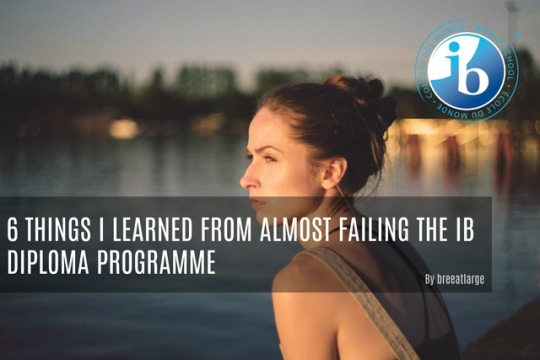Bree is a first year INTP business student at the University of Toronto. This is her personal blog. Bree At Large features a compilation of academic and professional development resources, Bree's personal tips and records from Bree's academic and personal life. For more information about Bree, see the "About me" page accessible by the main menu. Tracking #breeatlarge
Don't wanna be here? Send us removal request.
Photo

As a former IB-centric studyblr (see Exhibit A here), I think that it is fair to say that I am a pretty strong IB advocate. There was nothing I loved more than pushing drafts of my Extended Essay at my mentor, complaining about CAS reflections and pretending to understand the complexities of TOK. But as May rolled around and my confidence in my abilities began to roll into July, I was in for the shocked of my life: instead of passing the program with my predicted academic achievement of 34/45, I just passed the program entirely, finishing with a score of 28/45. I was pretty shocked to say the least. As a toast to my astonishing academic feat, fake philosophy TOK and CAS social statuses on ManageBac: here’s 6 things I learned from almost failing IB, one point for every one that I lost in final exams.
Your grades do not define who you are: 80% exams and 20% moderated internal assessments? Where is the value in that classwork, discussion and studying? Is it all down the drain from here? Chemistry maybe. (Just a joking art-business student here.) Something that I really learned to appreciate is the versatility and application of studies that IB ingrains in their students. A combination of luck and talented teachers, my love for economics and business stems almost entirely from classroom discussions and case studies in Economics HL. I knew that business studies were for me as soon as I finished my first commentary.
Measure your pride not in how others judge your success, but in how you feel you have progressed: I think over the course of my two years in this program, I submitted over 4 drafts of my work to my Extended Essay mentor. While most students groan at the thought of a credit-less assignment, I could not be more excited to explore something I was interested in academically, not to mention having the motivation and opportunity to share it with others. At my graduation ceremony when I was asked to share the thing I was most proud of, I did not hesitate to say my Extended Essay. Does it suck to go from a B to a D? Absolutely. But that doesn’t discount the fact that I worked my ass off on that paper and I know that my mentor loved what I wrote. I gained a greater appreciate for literature and anthropology and honestly right now: that’s all I really need.
Don’t judge the dropouts: I will not be the first to admit that IB students sometimes have an elitist attitude when it comes to academics (especially compared to AP and regular program students). Sure, my program may be internationally-focused, but that’s no more than a few works in translation books in literature class or case studies in economics. At the end of the day, external markers control 100% of your grade (IAs are moderated, do not ever forget it) and if you’re like me, those same AP or regular program students you were putting down probably graduated with a higher average than you.
Your teachers are human too: One of my favorite things about IB is that everyone really is a team working together to have a greater success rate. It’s rarely you versus your teacher. I graduated knowing that my teachers did the best they could possibly do for me and it’s such a toss up what results in the end.
Keep your personal life on hold during the academic season: One of my biggest regrets for several reasons is that right around exams, I had a major falling out with my best friend and confidante of four years. It sucked, as most breakups do, but the worst part is that when I should have been focusing more on studying, I could barely get out of bed. Friendships are forever until nobody talks anymore and those grades that got you into university could have also resulted in making new friends.
Choose your friends diversely: So my strength is in languages and social sciences, but the way I designed my IB program focused heavily on the natural sciences and engineering. My closest friends and I were complete opposites which made up for great conversations and interesting perspectives. Through them, I gained a deep appreciation for science and mathematics. Even though these subjects may not be my favourites, I will always look to them with an open mind.
What advice would you share with high school students about your experience? I know that really hit home for me is the ability to reflect and journal. (Damn CAS for actually teaching me something useful in the end!)
Follow me on Tumblr
Continue the conversation via Disqus
More of my original content
Other advice posts
Other text posts
#me#advice#text#studyblr#ibo#ib#international baccalaureate#studybeehs#izzystudies#acahdemia#sciencescribbles#leostudies#academnis#studyrelief#ib-stvdies#ibwater
86 notes
·
View notes